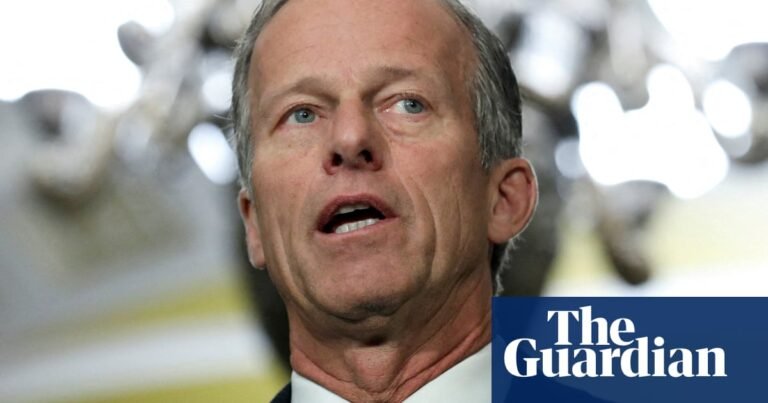The Republican-controlled US Senate advanced president Donald Trump’s sweeping tax-cut and spending bill in a key procedural vote late on Saturday, raising the odds that lawmakers will be able to pass his “big, beautiful bill” in the coming days.
The measure, Trump’s top legislative goal, passed its first procedural hurdle in a 51 to 49 vote, with two Republican senators voting against it. There was still work to do for the bill to actually gain passage in the Senate, which might not happen until about Monday. Democrats forced Senate clerks to read the entire, 940-page bill – and then an unlimited number of amendments could be brought up for consideration in a marathon session colloquially known as a vote-a-rama.
Saturday’s result came after several hours of negotiation as Republican leaders and vice president JD Vance sought to persuade last-minute holdouts in a series of closed-door negotiations.
The procedural vote, which would start debate on the megabill to fund Trump’s top immigration, border, tax-cut and military priorities, began after hours of delay.
It then remained open for more than three hours of standstill as three Republican senators – Thom Tillis, Ron Johnson and Rand Paul – joined Democrats to oppose the legislation. Three others – Senators Rick Scott, Mike Lee and Cynthia Lummis – negotiated with Republican leaders into the night in hopes of securing bigger spending cuts.
In the end, Wisconsin Senator Johnson flipped his no vote to yes, leaving only Paul and Tillis opposed among Republicans.
Trump on social media hailed the “great victory” for his “great, big, beautiful bill.”
The megabill would extend the 2017 tax cuts that were Trump’s main legislative achievement during his first term as president, cut other taxes and boost spending on the military and border security.
But the controversial bill has caused division, with Elon Musk, the billionaire Trump donor again coming out in strong opposition to the House version of the bill, denouncing the Senate draft on his social media platform, X, on Saturday.
“The latest Senate draft bill will destroy millions of jobs in America and cause immense strategic harm to our country!” Musk wrote above a comment from a green energy expert who pointed out that the bill raises taxes on new wind and solar projects.
“Utterly insane and destructive,” Musk added. “It gives handouts to industries of the past while severely damaging industries of the future.”
Nonpartisan analysts estimate that a version of Trump’s tax-cut and spending bill would add trillions to the $36.2-trillion US government debt.
Democrats fiercely opposed the bill, saying its tax-cut elements would disproportionately benefit the wealthy at the expense of social programs that lower-income Americans rely upon.
Chuck Schumer, the Senate’s top Democrat, demanded that the bill be read aloud before debate could begin, saying the Senate Republicans were scrambling to pass a “radical bill”.
skip past newsletter promotion
Get the most important US headlines and highlights emailed direct to you every morning
Privacy Notice: Newsletters may contain info about charities, online ads, and content funded by outside parties. For more information see our Privacy Policy. We use Google reCaptcha to protect our website and the Google Privacy Policy and Terms of Service apply.
after newsletter promotion
Trump is pushing Congress to wrap it up, even as he sometimes gives mixed signals, allowing for more time.
The legislation is an ambitious but complicated series of GOP priorities. At its core, it would make permanent many of the tax breaks from Trump’s first term that would otherwise expire by year’s end if Congress fails to act, resulting in a potential tax increase on Americans. The bill would add new breaks, including no taxes on tips, and commit $350bn to national security, including for Trump’s mass deportation agenda.
Some lawmakers say the cuts go too far, particularly for people receiving healthcare through Medicaid. Meanwhile, conservatives worried about the nation’s debt are pushing for steeper cuts.
The final text includes a proposal for cuts to a Medicaid provider tax that had run into parliamentary objections and opposition from several senators worried about the fate of rural hospitals. The new version extends the start date for those cuts and establishes a $25bn fund to aid rural hospitals and providers.
Most states impose the provider tax as a way to boost federal Medicaid reimbursements. Some Republicans argue that is a scam and should be abolished.
The nonpartisan congressional budget office has said that under the House-passed version of the bill, some 10.9 million more people would go without healthcare and at least 3 million fewer would qualify for food aid. The CBO has not yet publicly assessed the Senate draft, which proposes steeper reductions. Top income-earners would see about a $12,000 tax cut under the House bill, while the package would cost the poorest Americans $1,600, the CBO said.
